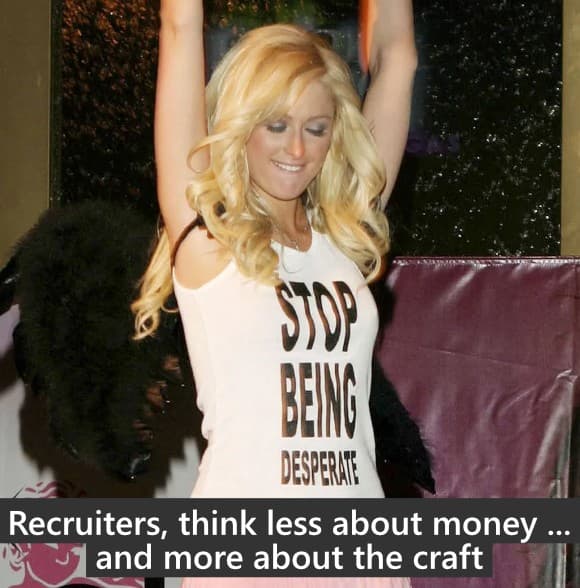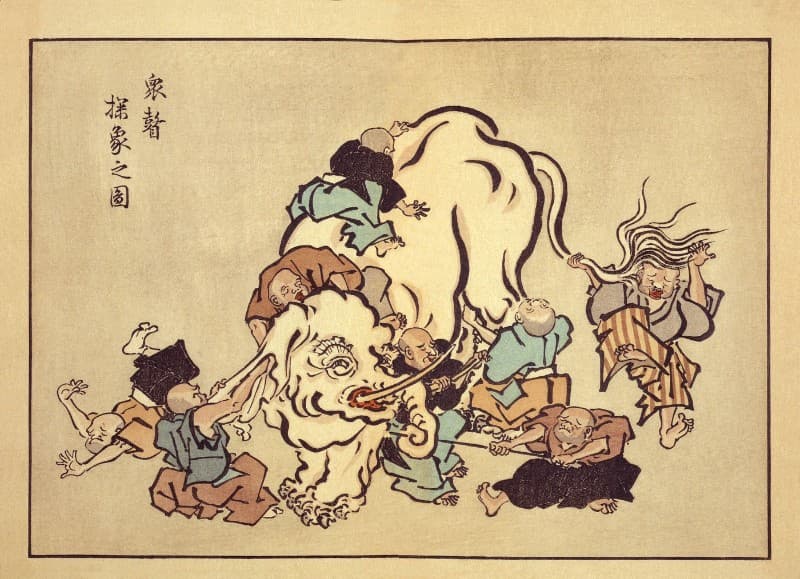Reading time: 9 minutes

Recruiters are rarely proud of what they do. Most do it solely because the money can be great. It is no surprise that depression among recruiters is common, and the level seems uniquely high in our profession. I don’t remember that my dad, an engineer, would ever complain about the core of his work (fix things, build things), he'd complain only about office politics and people issues. I have yet to meet a recruiter who doesn’t complain about their job.
Here are some quotes from recruiters that baffled me when I started in the business but which I understand now because I felt exactly the same:
By an in-house recruiter of a FAANG company:
“I hate people, I really hate all people and can’t stand them”
By an agency recruiter mainly involved in placing contract tech workers:
“I drink, I drink a lot of alcohol; actually, I have to drink all the time”
Another person told me stories over beers of how his recruitment firm manager invited him to cocaine and hooker parties on a regular basis blowing through all the money they made during that month, stories that are hard to put in quotes.
The average recruiter interacts with more people in a month than most people do in their entire work-life. People recruiters interact with aren't happy, they are looking for work and are desperate. And there are fewer pathetic situations in life than being out of a job.
Recruitment is an emotional roller coaster. You experience both good and bad with a high variety. People are both kind and terrible to you. When writing this article, I could only recall bad things.
If you stay long enough in recruitment, you essentially lose faith in humanity. It becomes normal for you to see people promising one thing and do the exact opposite later. Often what you have to endure is a form of mental mistreatment; candidates and clients break promises that cause you great psychological and financial harm. Recruitment is the profession with the most human interaction and very different from any other job.
Charlie Munger famously quotes “Being unreliable” as a primary cause for a bad, unhappy life. In Recruitment, you really get to feel the most unreliable side of most humans. At my lowest point, I even lost the wish to have children. I thought that there is no point in putting more humans on earth if the default behaviour of some is being terribly unreliable liars.
Other professions also have a big human element. Real estate agents, doctor, prostitutes. Yet, one can argue they are still better off in many cases: Real estate agents work “retained”. (The client guarantees to work only with that one agent.) Doctors get a bigger feeling of accomplishment out of their work; they heal people and society respects them for it. And prostitutes, having a very low social status associated with their work, likely can say something like they did their individual part to make a client happy, while recruiters always think “all these people might have gotten the job anyway without my help”.
Being a former programmer I suffer somewhat from the “teacher” problem. I recruit software engineers and see them constantly screw up in interviews for the most stupid reasons and can’t help but think “I can do that better”, “why are they so dumb?”, “what is the point of all of this, if everything goes wrong at the last moment?”
As a recruiter, you’re subject to a lot of moving parts and it is hard to guess where your next paycheck will come from. Sometimes clients even decide after the fact that they are paying you too much and try to haggle you down or ask for money back if the candidate doesn’t fulfil their expectations. It's suffering throughout, until the guarantee period is over.
Moments where people screw you over will stay with you forever, you rarely forget bad events, while the good moments last only briefly. I had both candidates and clients praise and thank me a thousand times but I already forgot it. The sad part is that human biology makes us remember the terrible parts more vividly than the good parts; mother nature wants us to avoid bad things in the future. In Fooled by Randomness, Nassim Taleb writes: "People remember negative events 2.5x stronger than positive ones." One could say, losing $25k feels worse than winning $10k feels good.
Some candidates and clients can be great but many won’t ever value what you do. Sometimes I think that the only people you can expect respect from is your banker and tax consultant.
There is light at the end of the tunnel
First, remind yourself that recruitment is the only profession that you can do entirely remotely. Doctors, real-estate agents and prostitutes can't do their work without their body being at some place. Just the remote-work option puts recruitment in the same category as coding and makes it a “luxury profession”.
I admit, luck plays a big role in recruitment; people say timing matters more than the quality of your outreach message. If you cold email someone with an amazing text and they’re not looking, they’ll ignore you. If you cold e-mail them with a badly written text and they are looking, they’ll answer. Yet that is only half the truth. Recruitment is a numbers game. Over the long haul, it’ll show who is skilled and who isn’t.
What you say to people matters. Reputation sticks and can grow over years. I lost count of the opportunities that came to me because someone spoke well about my work. Recruitment is rather meritocratic from that perspective. Pro tip: Capture that strategically by asking people regularly to review you on Google and Linkedin. The short moment when people feel happy about you should be used to leave a permanent online record about it.
Another plus with recruitment that people forget is that you can break into the profession, as so many do, from any other field. I am the the living proof that even well-paid, college-educated programmers prefer (self-employed) recruitment to employed coding. So, recruitment can’t be that bad.
The right mental model as a recruiter to have is that you do all your work “for free” and treat the rare occasion when you succeed as a gift. That resembles the reality that 80–90% of your activity goes nowhere and you have many mini depressions during your work day. Many can’t handle that experience. In that regard, coding is the opposite; you get many small dopamine hits over the course of the day, because you built a small feature, or fixed a bug.
In recruitment, like in most consulting businesses, you don’t produce anything or have any assets. The only intangible you own is your network, who is hiring, firing, who needs what. But only because it is intangible doesn't mean it has no value. Quite the opposite: You generate value for society by mixing this implicit knowledge with activity: You send the right resumes to the right places resulting in people getting jobs they otherwise wouldn’t get. This makes everyone involved happy including the government that can tax you, your clients, and the future employees.
Recruiters remove inefficiencies from society. Call recruiters what you want, fact is, they only survive if they do things right: if they put people to work quickly and reliably, and hence generate value that exceeds the placement fee by a big margin.
Stop being desperate
Aside from taking a bath and other relaxing activities, what helps me to be less depressed is to “just” do stellar work, "no matter what", and think of it as a craft. The feeling of having done all you could after an attempt to place a candidate into a job is the only thing that saves my mental health and goes far beyond the money.

When candidates or clients thank me I ask them to leave a review on my LinkedIn, not only to build a reputation but also to have an audit trail for when I am sad to go back to and read that I actually don’t suck that much. I go back to it once in a while and get energy from it (scroll through my currently 52 positive reviews on Linkedin). Few recruiters ask for recommendations, which baffles me. I once asked them in a Facebook group, and it seems to be just laziness. Don’t be lazy!
Like professional athletes who are only as good as their last performance, and like athletes, most recruiters will need motivational help or maybe even psychotherapy at some point. What keeps most people going in most jobs is doing stellar work. In recruitment, that is: Interviewing, pitching, preparing people for interviews and giving clients all the information they need about potential hire can be done as a craft.
In another blog post I wrote about the importance of great client notes as the main added value of recruitment firms. Writing great interview notes and giving each client additional information to make them feel like you prepared the candidate extra for them is one of the things that will make you stand out as a recruitment agent.
Does recruitment, at least sometimes, put you in a state of flow? A new generation of tools sets standards of how work apps should put you in a state of flow. Superhuman changed the way I do email. Every interaction is below 100 ms and I actually somewhat enjoy emailing now. No recruitment tool fulfilled the same need, so we developed an klang.so, an ATS that is minimal and to our knowledge the fastest recruitment agency ATS out there. Critical-path user interactions happen with keyboard-only shortcuts, using your mouse is optional. Klang.so truly makes me like recruitment more. Maybe it will do the same for you.

(Watch a full demo video of our ATS here: klang.so)
If you liked this blogpost, you might enjoy:
If you like my writing style, you might also enjoy:
We have built klang.so to make recruitment suck less for small recruitment firms, book a demo to hear more (iwan@klang.so, +1 (551) 261-5955, or leave your contact details below:




